Volunteers for IG. Migration and religious extremism in France
Back in October, 2014, the French secret service received information that a few dozen young citizens of France joined the "Islamic State" operating in Iraq and Syria. It is noteworthy that among the recruits was even a girl of Jewish nationality. The girls were recruited by professional recruiters specializing in working with young people. Naturally, the majority of girls traveling to the Middle East from France are migrants from the Muslim states of North Africa and Western Asia, or children from migrant families. Families themselves, most often, claim that their daughters have been kidnapped, but the intelligence services have information that an absolute majority of French citizens who went to fight made their choice voluntarily. We can remember the mysterious history Russian woman Vari Karaulova who converted to Islam and disappeared from her parental home. The girl was detained on the Turkish-Syrian border in a group of immigrants from Russia and the former Soviet republics. As it turned out, even in Moscow she led a double life - she left the house, changed into Muslim traditional clothes. This pattern of behavior is very common among many young citizens of France who do not want to inform parents about their belonging to radical organizations or their interest in the ideology of the latter. Only at the last moment do relatives find out about the genuine interests and deep religiosity of their daughters, most often when the girls disappear from their homes and concerned parents turn to law enforcement agencies for help.
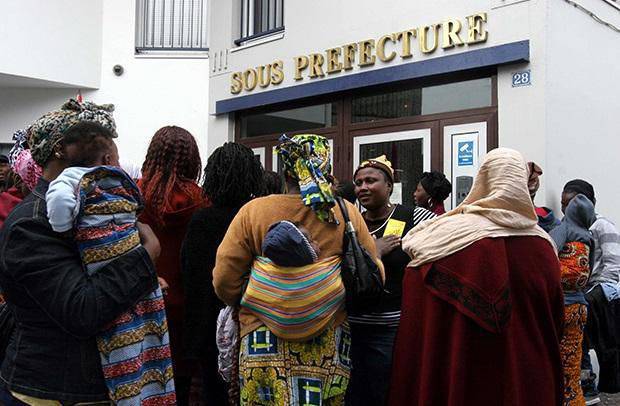
How migrants from the “East” appeared in France
The spread of Islamic fundamentalism in France was a serious problem for the country a few decades ago, and the events that we are witnessing today are the results of a process launched a long time ago. The history of French Islam is rooted in the colonial era. It was then, at the beginning of the twentieth century, that the first immigrants from the French colonies in North and West Africa who practiced Islam began to arrive in France. These were, above all, Arabs and Berbers from Algeria, Tunisia and Morocco. It should be noted that the increase in the number of foreign immigrants in France was caused by a decrease in the birth rate, which began to be felt even more than a hundred years ago - at the end of the XIX century. Initially, the bulk of foreign labor migrants were immigrants from less developed countries of Europe. So, by 1872, the share of immigrants in the population of France reached 2% of the total population of the country. However, these were culturally close French-speaking Belgians working in factories and fields in the north of the country. Later, the number of immigrants began to grow due to the influx of Italians located in the south and southeast of France. With regard to immigrants from the North African colonies, the first in France appeared merchants fabrics from Algeria. In 1874, Algerians were officially allowed to work in France, and by 1912, thousands of Algerians lived in the country around 3,5, mostly working on docks, soap factories and construction. Most of the Algerian workers who worked in France belonged to Kabili - the Berber national minority of Algeria. At the beginning of the twentieth century. the first Moroccans began to penetrate into France. They settled on the factories of Nantes and Bordeaux. By 1913, immigrants constituted 3% of the population of France, and the total number of immigrants from North African colonies who lived and worked in the metropolis reached 30 thousand people.
However, the transition to a migration policy that contributed to the emergence of the situation that we can observe at the present time occurred after the First World War and was due to the following factors. First, during the First World War, France actively used military units staffed by immigrants from the African colonies. Over 40 thousands of African soldiers died in the battles for France. There was a more specific acquaintance of Africans with life in the metropolis. Secondly, the desire of the French capitalists to extract maximum profits from the exploitation of labor has led to the introduction of contract recruitment of workers to French enterprises in African colonies, primarily in Algeria. We can say that it was the French industrialists and entrepreneurs of the first half of the twentieth century. and laid the foundation for further growth in migration from Africa to the metropolis. Between 1914 and 1928 471 390 migrants from Algeria arrived in France, but the 365 024 migrants subsequently returned to their homeland. The main streams of Algerian workers were sent to Paris, to industrial enterprises and mines of North-Eastern France, to agricultural plantations in Picardy, Provence, Languedoc and some other regions. However, the Second World War significantly reduced the influx of immigrants. But, as in the First World War, a large number of Algerian, Tunisian and Moroccan soldiers fought in the ranks of the French army, which were equipped with entire units of the French army. After the war, French demographers noticed a decrease in the country's population. France’s losses in the war amounted to about 1 million, and the population deficit varied, according to demographers, from 5,5 to 14,4 million. Thus, the country needed to replenish human resources and it was decided to achieve this goal by encouraging migration from the North African colonies, primarily from Algeria.
The French government focused on inviting about 1,5 million Algerian migrants to the country for a period of five years. Attracting migrants from North African countries continued after the latter gained political independence. The emphasis on attracting Algerian, Tunisian and Moroccan migrants was due to the much lower cost of their labor compared to the labor of Portuguese and Italian migrants. The proportion of immigrants among French workers was rapidly increasing. So, already at the beginning of 1950's. immigrants accounted for 79% of metallurgical workers, 72% of agricultural workers, 68% of construction workers and 59% of miners. Against the background of the permanent growth of immigration from Morocco, Tunisia and Algeria, Spanish, Italian and Portuguese immigration declined. Living and working conditions in these countries of southern Europe improved, and therefore many wage workers who worked in France returned home. Their places were occupied by Algerians, Moroccans and Tunisians, in contrast to the Italians, Spaniards and Portuguese who had enormous differences with the indigenous people of France - in religion, in language, in culture, in lifestyle and behavioral attitudes.
At the beginning of the 1970's the crisis in the French economy, which coincided with the deterioration of French-Algerian relations, contributed to a change in the country's policy regarding the admission of North African, and first of all, Algerian, immigrants. The growing number of Algerian immigrants amid rising unemployment in France provoked negative sentiments of the indigenous population towards visitors. Algerians refused to rent housing, take them to work, right-wing activists attacked them. In July, 1974 adopted a decree stopping foreign labor immigration to France. The flow of immigrants began to decline. However, already at this time the number of North Africans who were permanently located in France was significant. In 1980, only Algerian immigrants accounted for 21% of the total number of immigrants living in France. Another 8% were Moroccans and 4% Tunisians - that is, North Africans accounted for a third of all foreign immigrants in France. Meanwhile, the original meaning of inviting immigrants to France was lost - the economic crisis led to an increase in unemployment, and more often immigrants were left without work. If the unemployment rate in the whole country was 9%, then among immigrants out of work were 12%. The French state had to shoulder the burden of maintaining Algerian, Moroccan, Tunisian and other immigrants who lost their jobs and livelihoods. Social benefits were introduced for them, housing and educational services were organized. At the same time, competition for jobs among workers from North Africa and Tropical Africa increased. Unlike people from tropical Africa, North Africans were more skilled, but confessional differences with the French contributed to the preservation of the rigid cultural boundaries of immigrants and indigenous people.
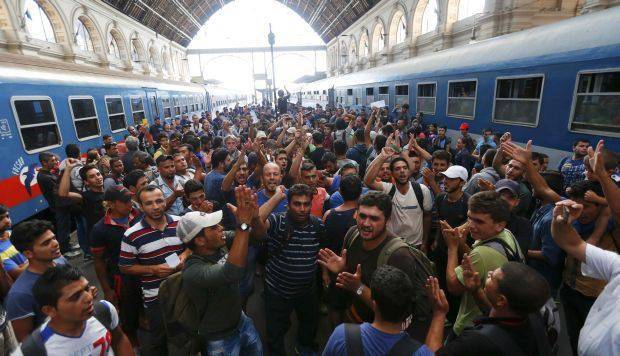
Assimilation or multiculturalism?
The increase in the number of migrants in France contributed to the actualization of political and scientific disputes regarding possible strategies for the adaptation of migrants to life in French society. Polar points of view - complete dissolution (assimilation) of migrants in the host society and the preservation of cultural identity in the framework of a "multicultural" society. The French left advocated the “inclusion” of migrants into French society, with the possible preservation of their own culture, while the right insisted on the need to assimilate the already living migrants and stop accepting new migrants. However, it is obvious that immigrants from North African countries cannot assimilate into French society, at least in the foreseeable future. Accordingly, the projects for the assimilation of migrants look, to a large extent, utopian. The practical value of the concept of multiculturalism is also doubtful, since the preservation by migrants of their own culture entails not so much integration into French society as its separate component, but rather enclavescence, closure in its own environment with subsequent problems such as the formation of centers of African culture in France. If in the first generations of North African migrants, many of them were ready for assimilation and sought to sever ties with their homeland and past, being completely dissolved in French society, then modern migrants, as well as children of the first generations of migrants, tend to emphasize their “otherness”. Preserving identity - Algerian, African or Islamic - becomes for them one of the main tasks, because it allows them to find a place within French society, to create a comfortable environment for living and social activities. In an effort to identify their identity as Algerians, Moroccans, Senegalese, or simply Muslims, migrants and their descendants oppose themselves to a host society. Well acquainted with life in France, they see all the vices of the modern Western world and try to build their own line of defense, in which religious identity is combined with social opposition. The Islamic religion plays a huge role in preserving identity. In fact, it is Islam that contributes to the preservation of Algerian, Moroccan and other African migrants as closed communities, preventing them from dissolving in the confessional environment of the host society. Children of migrant families face a strong influence of French culture, since they receive education in schools where they communicate with peers from local families, they speak French since childhood, but “returning to the roots” in some sense becomes a way for them to “find themselves” in French a society in which they never fully become theirs. After all, so far at least 50% of French people have a negative attitude to the “Beram”, as representatives of the second generation of North African migrants are called in France. Another category of descendants of migrants is brought up in a closed environment. Conservative families impede communication with French peers, require adherence to religious regulations and national customs, look for marriage partners only among fellow tribesmen or, in extreme cases, fellow believers.
The marginal social position of the “Berovs” is becoming one of the main reasons for the spread of crime and religious extremism among them. A public demonstration of adherence to religious norms becomes for them a way of identifying and opposing themselves to the indigenous population. It does not even matter the degree of personal faith or the actual observance of religious precepts, much more important is the external demonstration of their “otherness” and the constant assertion of the right to this “otherness." If up to 1980-x - 1990-x. North African migrants chose not to publicize their commitment to religious and national traditions, either because of their own focus on assimilation, or for security reasons - for fear of attacks by right-wing radicals or deportation, then in 1990 and, especially, 2000, African and Asian migrants It has become increasingly frank to demonstrate their religiosity, loyalty to national traditions, and disregard for the norms of life and behavior in a host society. This was facilitated by the policy of left-liberal political parties, human rights organizations, which took the position of unquestioning support for migrants, defending the correctness of the latter, even in those cases when they were objectively wrong. As far as left-wing liberals can agree in their desire to indulge in immigration, numerous statements by European left-liberal politicians are showing, for example, that European girls provoke visitors to commit rape with their appearance. The left-wing liberals take an unequivocal position - the first is to blame for any conflict between a representative of the European population and a migrant, since he cannot understand the migrant’s “cultural otherness” and does not want to be considered with it.
However, such a position of left-wing liberals indicates the existence of elementary contradictions in their own ideology and political practice. On the one hand, left-wing liberals have always advocated the emancipation of women, respect for human rights, and fighters for the rights of national and sexual minorities. On the other hand, demanding to respect the rights of migrants arriving in France, they forget that the traditional way of life and customs of these migrants directly contradict the observance of human rights, especially women. Clumsy attempts to convince visitors to abandon the traditional views on the position of women, argued by the norms of religion, entailed a bloating of scandal around wearing hijabs. Back in 1989, two young French citizens refused to go to school without hijabs. Since that time, the number of Muslim women - students and schoolgirls who wear the hijab, began to increase rapidly. The French government could not come up with another way out, how to prohibit the wearing of hijabs and, thus, turn the Muslim population of the country against themselves. Another time bomb was planted under the socio-political stability of the modern French state. The dispute about the possibility of wearing traditional religious clothing in educational institutions in France continues to this day. The introduction of the ban on wearing the hijab put Muslims in the country in an ambiguous position - either to refuse to observe religious orders, which is unacceptable for believers, or to stop their studies and, accordingly, to refuse from further professional career, self-realization, etc. Obviously, the occurrence of such a situation in itself is indicative of the extreme lack of professionalism of French politicians and officials responsible for shaping the strategy of migration and national policies. Against the background of the huge number of Muslim migrants living in the country and the continuing influx of immigrants and refugees from Africa and the Middle East, such measures against Muslim girls seem at least strange. It is necessary or to radically change the migration policy, creating insurmountable obstacles to new migrants and deporting all “old” stateless migrants, or develop models of peaceful and effective coexistence of representatives of different religions and cultures within French society.
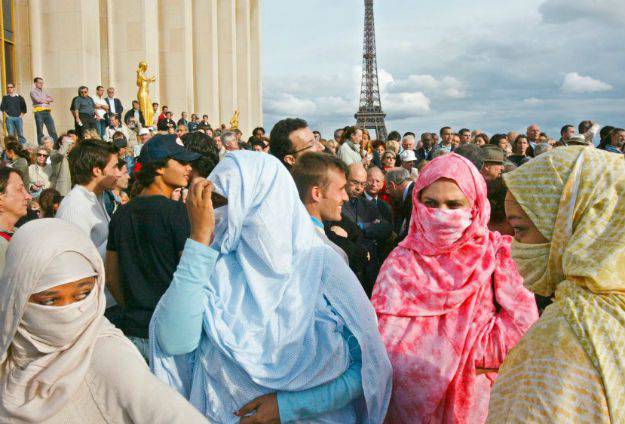
The radicalization of migrants and the Islamization of the French
The ill-considered actions of the French government play into the hands of radical forces in the migrant environment, contribute to further aggravate the mutual rejection of the indigenous French and visitors from African and Asian countries. At present, immigrants from 127 countries live in France, but the Muslim diasporas are the most numerous. In the first place - immigrants from Algeria, whose number exceeds 1 million. man, followed by the Moroccans (about 1 million pers.), Tunisians (at least 600 ths. people), people from Islamized countries of Tropical Africa, Turks, Syrians, Iraqis, Lebanese. Some areas of large French cities and even some small cities actually changed their original face, becoming Arab and African enclaves in France. Migrants make up the main population here, since the indigenous people of the country prefer to leave areas and settlements with a predominantly visiting population. As a result, a rather closed environment of “ethnic ghettos” is being formed, which becomes an extremely fertile ground for the spread of radical sentiments and the recruitment of members for extremist organizations. This, in turn, contributes to the further growth of anti-migrant sentiments among the French and to strengthening the position of those political forces that are in favor of restricting migration flows and tightening control over migrants in the country. It should be noted that the presence of such a significant number of African and Middle Eastern migrants makes certain adjustments in the culture of the French population. If earlier the French colonies in Africa and the Middle East were influenced by the French culture, today there is a reverse process - migrants influence the surrounding French population. This process is manifested, including in the Islamization of the representatives of the indigenous population of France. According to some reports, today Islam has adopted at least 50 thousands of French. According to media reports, only in the department of Essonnes Islam adopted about 2 thousand. the French. It should be noted that the adoption of Islam for many French means a demonstration of their break with the "decaying" Western civilization. It is significant that even in the twentieth century. many prominent French intellectuals converted to Islam. So, one of the first French to convert to Islam was the famous traditionalist philosopher Rene Guenon (1886-1951). Even at the age of 26, he adopted Islam and a new name - Abd-al-Wahid Yahya. In 1930 was 44-year-old Guenon moved to Cairo, where he married the daughter of Sheikh Mohammed Ibrahim, who belonged to the Fatimid lineage - the descendants of the Prophet Mohammed. In 1982 was Islam was adopted by the French historian 69-year-old Roger Garaudy (1913-2012), known for his denial of the Holocaust. Roger Garaudy was called in the Muslim manner of Reg Jardi. Even during the struggle for the national liberation of Algeria, Islam was received by the famous lawyer Jacques Verges (1925-2013). He married Jamila Buhired, an Algerian revolutionary who he defended in an explosion at a French cafe. For a certain part of French society, the adoption of Islam has always been an act of solidarity with the anti-imperialist and anti-colonial struggle of the peoples of the former French colonies, therefore in the 1960-1980-s. Among the newly converted French Muslims were many left-wing and radical left-wing activists. However, within the framework of the same French society, there is a serious cultural split, fraught with very negative consequences for the French national identity and security of the French state. At least 50% of French Muslims identify themselves, first of all, as Muslims, and only then as citizens of France.
At present, young people, including teenagers, predominate among the French who convert to Islam. The pace of Islamization is increasing in the penitentiary institutions of France, where French prisoners have the opportunity to daily communicate with African prisoners and Asians, as a result of which they become acquainted with the religious and ideological views of the latter. Former French counterintelligence leader Yves Bonet, who founded the International Center for Research on Terrorism and Assistance to Victims of Terrorist Attacks, stresses that “unfortunately many people in prison are beginning to converge like that, given the forced idleness in which they are. There are discussions in prisons. Many of those who go there feel unjustly convicted. And this is one of the main levers of pressure. In addition, there is still propaganda in some religious centers, which is led by some religious figures ”(http://ru.rfi.fr/frantsiya/20140106-eks-glava-kontrrazvedki-frantsii-v-radikalnyi-islam-frantsuzov-obrashchayut- v-tyu). Former prisoners are attracted to Islam by the positive sides - the refusal of alcohol, smoking, drug use, the ability to radically change their lives. However, the pious motives of such people are often manipulated by professional propagandists. It is new Muslims who are of great interest to recruiters of radical organizations. First, due to the inherent maximalism of the neophytes, they are more prone to literalism, the perception of radical tendencies. Secondly, the Europeans, who have real estate and social status, and most importantly, their own nationality, which inspires confidence in police and counterintelligence, are an ideal contingent for replenishing the ranks of militants and terrorists. Naturally, young people are the most susceptible to radical propaganda. Some of them join the ranks of radical organizations under the influence of their beloved, befuddled with feelings and ready to go with a loved one (beloved) to a transition to another religion, and to join a radical organization, and even volunteer for the Middle East . It is known that several ethnic French have already died in Syria and Iraq, fighting on the side of the IG formations.
Features of the spread of Islam in modern Europe today - one of the most popular areas of sociological and religious studies. Scientists predict a further increase in the number of Muslims in the Western world. So, Tariq Yildiz, who works at the Center for Sociological and Political Studies in Paris, argues that Islamization is a pan-European trend and is explained by two main factors - the scale of migration flows over the past few decades and the high birth rate in Muslim families. According to the scientist, the number of Muslims in Europe, including France, will only grow, which implies the need to develop such a political strategy of the state, which allows, on the one hand, not to offend wide sections of Muslims, not to discriminate them, and on the other hand - to resist the spread of radical currents. Chokan Laumulin, who works at Cambridge University in the United Kingdom, sees the appeal of Islam in two main pillars of his sermons in the modern world — social justice and internationalism. That is, it satisfies the social demand for internationalist and social ideology, such as Marxism and anarchism in the past century, which also had the widest distribution. For unemployed youth from the Parisian outskirts and small towns, representing ethnic and social ghettos, religion becomes hope, gives a reason for existence, and this, in itself, is very significant, especially for people who are chronically in difficult social situations. The need to resolve the current situation in France in the sphere of interfaith and interethnic relations is also understood by Muslim intellectuals. Thus, one of the leaders of the Muslim Association of France, the chairman of the Coordination Council against racism and Islamophobia, Abdelaziz Shaambi, believes that it is necessary to adapt the interpretation and practice of Islam to the conditions of life in the host French society. However, at the same time, according to the public figure, it is necessary to maintain loyalty to religious principles, not abandoning their own faith, but not insulting the representatives of the indigenous population.
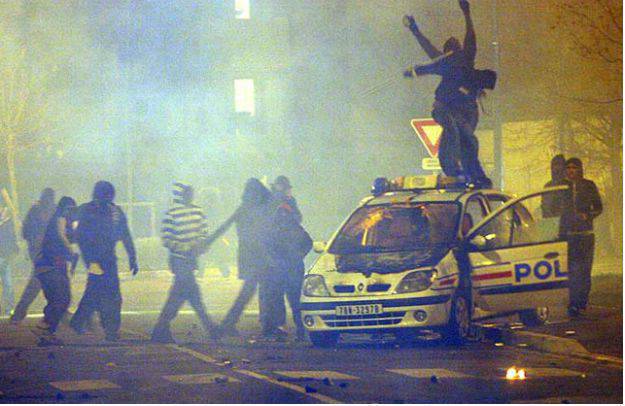
From terrorist attacks in Paris to the war in Syria
In January, 2015 in France saw a series of terrorist acts caused by the publication of a caricature in the satirical magazine Charlie Hebdo. 7 January 2015, unknown persons burst into the editorial office in Paris and opened fire with firearms. As a result of the shelling of the editorial office, 12 people died, including two police officers. According to media reports, the editorial office was attacked several hours after the appearance of a cartoon on Abu Bakr al-Baghdadi, one of the leaders of the Islamic State of Iraq and the Levant, on the Twitter social network. On January 8, an unidentified man shot and killed a police officer in the city of Montrouge, and on January 9, 32-year-old African Amedi Coulibaly, armed with automatic weapons, seized a kosher grocery store in Paris. During the attack on the store killed four people. The attacker took a 15 hostage, but by the evening of the same day the special forces of the French police had been eliminated. The terrorist attack against the satirical magazine was conducted by the brothers Said and Sheriff Kouachi - French-Algerians, whose parents arrived in France from Algeria. Said was trained in one of the fundamentalist camps in Yemen, while the Sheriff recruited volunteers to take part in the fighting on the side of the “Islamic State” in Iraq and Syria.
However, the brothers Kouachi and Amedi Coulibaly are still descendants of migrants. But in the ranks of radical organizations, the number of ethnic French who converted to Islam is growing. According to media reports, in the Middle East today no less 1100 of the French are at war. French Prime Minister Manuel Waltz in June 2015 called the number in 1730 French citizens fighting on the side of the IG in Syria and Iraq, and stressed that 110 of them, according to intelligence, had already died during the fighting. It is known that among the dead there are French minors who fled from their families to the Middle East. The French Interior Ministry reports that human losses among French citizens fighting on the side of the IG increased significantly in 2015 compared to the previous year - this indicates both an increase in the number of French fighting in Syria and an increase in their number directly combat formations of the IG. In the execution of the American hostage Peter Kassig and a group of officers of the Syrian government troops, according to the French Interior Ministry, participated and the Frenchman Max Oshar. A twenty-two-year-old resident of Normandy converted to Islam at the age of majority and volunteered to go to Syria, where he later appeared as the executioner of one of the "IG" detachments. A nineteen-year-old Frenchman named Pierre in October 2013 secretly left his father's house and went to Syria - “to help the Syrians and Syrians,” as he wrote to his parents in a note he left. Soon Pierre, whose name was already Abu al-Talha Faranshi, exploded at a military base in the Iraqi city of Tikrit. French Defense Minister Jean-Yves Drian said that among the militants of the "Islamic State" there are also former soldiers of the French army - both persons of Arab-Muslim origin and French who converted to Islam in adulthood. According to the minister, we are talking about dozens of people, among whom there are people from the elite special forces of the French armed forces - a regiment of paratroopers of the marines, as well as former fighters of the French Foreign Legion. In one of his speeches, French Prime Minister Manuel Valls actually signed the weak work of the French special services. According to the prime minister, counterintelligence was aware of only half of the 800 French citizens who went to Syria and Iraq. The head of the French government drew attention to the insufficient resources of the special services to monitor such a large contingent of potential volunteer fighters, since monitoring each of them may require the participation of twenty operational workers.
The escalation of violence in the Middle East and North Africa after the notorious “Arab Spring” has contributed to a multiple increase in the influx of Muslim migrants arriving in Europe. Now these are not migrant workers who arrived earlier in search of work and a better life, but forced migrants and refugees from the warring Syria, Iraq, Libya, Yemen. Many of them were initially not set up to emigrate to Europe, were not going to live there, but the war forced them to leave their homes. Naturally, the refugees view their stay in Europe as temporary and do not intend to integrate into European society. But it is possible that they will have to stay in European countries for years, and maybe for permanent residence. One of the most important issues that worries the authorities and special services of European states today is the likelihood of the presence of almost two million refugees and potential migrants and potential terrorists and extremists. After all, it is practically impossible to establish whether a particular person had any involvement in radical organizations, and perhaps even experience in participating in hostilities and terrorist acts. This creates fears that the militants of the same IS may, under the guise of refugees, penetrate European countries with the aim of committing sabotage and terrorist acts. The practice of using women, adolescents and children as terrorists does not allow isolating more dangerous groups among arriving refugees: there is always the risk that the terrorist will be not a young man, but a mother with several children or a thirteen-year-old teenager.
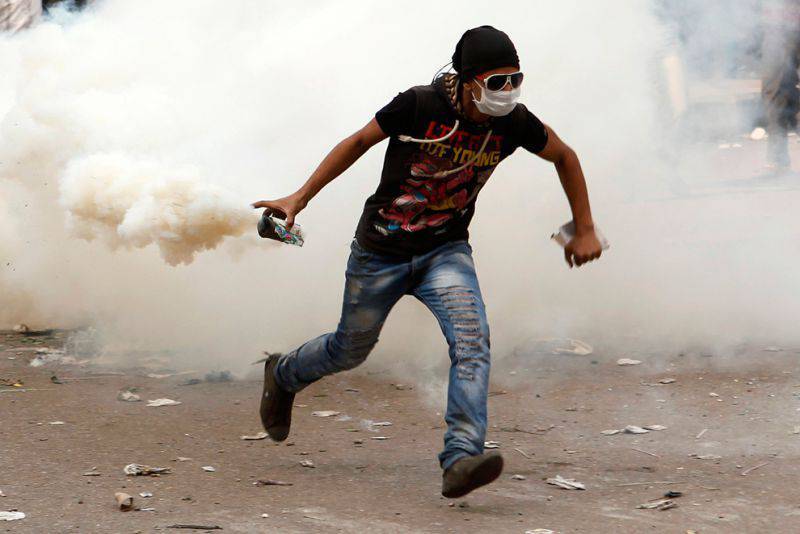
Information